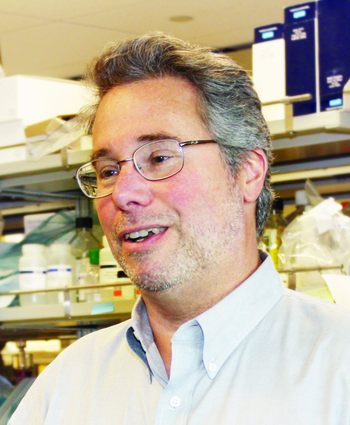UW-Madison alumnus wins major award for exploring chemistry of the nervous system
Richard Scheller, who graduated from UW–Madison with a B.S. in biochemistry in 1974, has shared the 2013 Albert Lasker Award for Basic Medical Research for work explaining how messenger chemicals move between nerve cells.

Richard Scheller
Scheller is currently executive vice president for research and early development at Genentech, a large medical biotechnology firm in California.
The Lasker Award is often called the “American Nobel,” and 83 winners have gone on to win a Nobel Prize. Scheller shared the award with Thomas C. Südhof of Stanford University. He donated his portion of the $250,000 prize to the Wildlife Conservation Network, which supports “entrepreneurial conservationists.”
The award recognized Scheller’s and Südhof’s research into the way chemicals move between neurons, the nerve cells that communicate with each other. Neurons use chemicals to communicate whenever one throws a ball, hears a Beethoven string quartet or remembers a face.
Both scientists focused on the tiny containers, called vesicles, that hold these neurotransmitters until the release is triggered. Then the transmitters can cross a tiny gap and stimulate a neighboring neuron.
Working separately, Scheller and Südhof explored the structure of the proteins involved in this rapid, complex interaction. The animal nervous system is a network of individual cells, and communication between those cells — the essence of neurological functioning — happens countless times every second.
“Part of human nature is to be curious, and for Rich, it’s been a remarkable achievement to sustain this curiosity and develop technical skills, to be able to work with colleagues, to be challenged by others and to stay focused.”
Bassam Shakhashiri
Born in 1953 and raised in the Milwaukee suburbs, Scheller was interested in chemistry as a teenager, but did not become a serious student until he enrolled in UW–Madison and began to focus on biochemistry in 1971.
In an oral history completed in 2002, Scheller remembered, “There are a lot of very dedicated teachers at the University of Wisconsin. I thought that the classroom lecturing was generally outstanding. There were tremendous opportunities, even at a large state school, to do individual research and an honors undergraduate thesis.
“I have had a little more experience with different universities now and can look back and say the University of Wisconsin is an absolutely terrific, first-rate institution. I owe a lot to them for the education that I received there.”
Scheller made a mark from the beginning, recalls Bassam Shakhashiri, professor of chemistry. “He stood out right away in Chemistry 104, a second-semester course — not only in academics, but in the personal interactions during office hours and as I walked around the lab.”
Shakhashiri, who remains in contact with Scheller, says, “Part of human nature is to be curious, and for Rich, it’s been a remarkable achievement to sustain this curiosity and develop technical skills, to be able to work with colleagues, to be challenged by others and to stay focused. What he has done is a great tribute to the ingenuity of the human brain.”
After Wisconsin, Scheller got a Ph.D. in chemistry from the California Institute of Technology and was a professor at Stanford University. He joined Genentech in 2001, and is active in the overall research direction of the company, and of its parent, the Swiss pharmaceutical giant Roche.
